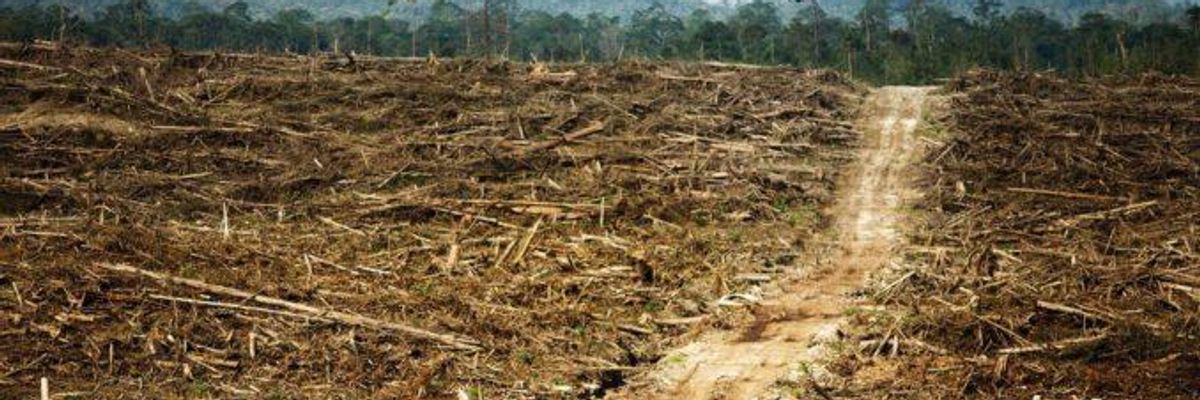A recent investigation by the anti-poverty advocacy organization Oxfam reveals how the world's top ten food and beverage companies are failing to protect environmental and human rights defenders caught in the companies' supply chains.
The Oxfam report, Pathways to Deforestation-Free Food, demonstrates how Associated British Foods, Danone, Coca-Cola, General Mills, Kellogg, Mars, Mondelez, PepsiCo, Nestle and Unilever have committed to tackling deforestation caused by their companies, but crucially lack policies to protect local activists and environmentalists within their supply networks from violence, threats, and attacks.
"A glaring policy gap across all the companies analyzed," the Oxfam report found, "is that none have policies to protect human rights defenders, nor require their suppliers to put in place policies of zero threats, intimidation or attacks against human rights defenders and local communities."
Industrial farming of food ingredients such as soy and palm oil, for example, have led to massive deforestation and displacement of rural communities in Indonesia, Brazil, Colombia, and elsewhere throughout the globe. Activists standing up against such industries in defense of forests, rivers, land, and the livelihoods of local communities have been threatened and murdered at an increased rate in recent years.
Four environmental activists were murdered each week in 2016 for defending their communities and environment from the impacts of agribusiness, mining, and logging industries, according to a report from the human rights organization Global Witness.
In Colombia, activists standing up against the impacts of El Cerrejon, Latin America's largest open-pit mine, have faced regular threats and violence.
Jakeline Romero has organized against the water shortages and displacement caused by this mine, which is owned by Glencore, BHP Billiton, and Anglo-American.
"They threaten you so you will shut up," Romero told Global Witness. "I can't shut up. I can't stay silent faced with all that is happening to my people. We are fighting for our lands, for our water, for our lives."
The world's leading food and beverage companies are not doing enough to stem the violence against environmental activists in their own supply chains, the new Oxfam report found.
"In many countries where agribusiness companies are investing, the rights of community activists are under attack because of their work to defend the rights of their communities--the right to forests and natural resources, to their land and water, their livelihood and their way of life," Oxfam stated.
"From violent crackdowns on protests and criminalization of speech, to arbitrary arrests and assaults or, in some cases, murder of human rights defenders, as well as restrictions on activities of civil society organizations, such attacks seek to delegitimize the voice and interests of communities," Oxfam explained.
Across the world, from Indonesia to Honduras, environmental defenders are facing down multinational corporations and the devastating impacts of their industries on local communities, rivers, forests, and indigenous ways of life.
Honduran activist and social justice leader Berta Caceres was murdered in March, 2016 for her environmental activism and leadership of the Civic Council of Popular and Indigenous Organizations of Honduras (COPINH).
In an interview on the legacy of her mother's struggle, Berta Caceres' daughter Berta Zuniga Caceres, explained the vision of COPINH and how it challenges the economic model guiding multinational corporations and their political allies.
"It's a very rich vision and one that exists among many indigenous peoples," Caceres explained. "It has to do with building a logic that's completely opposed to the hegemonic way of thinking that we're always taught. The vision and proposals are defiant, totally different than the academic, patriarchal, racist, positivist vision of the world. They include relations between people that are much more communitarian and collective, and that also have a strong relationship to the global commons and to nature, defying the dominant anthropocentric vision. They relate to spirituality and the relationships we have with all living beings - a holistic vision of life."
"Indigenous people find themselves battling extractivism, companies, mining, because that's the battleground where these different ways of knowing, of feeling, of cosmovision play out," she said. "This is the wealth of indigenous peoples. But it also represents a threat for the economic model that's based on profits and money, and that's developed through repression and exclusion."

